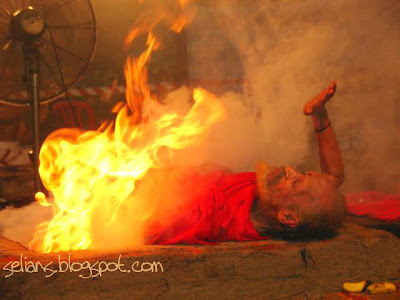On Death's Trail, a Detective Larger Than Life
BANGKOK - THE mild-mannered bank manager poked his head into the doorway, then quickly pulled it back. His wife was at work, and he did not want to look. He has never looked. He is afraid of corpses.
If the body on the stainless steel table inside had somehow awakened for a moment, it might have jumped, too, with shock.
Bending over it, with hungry fascination, was a woman whose head was covered with dark red spikes, whose lips were the color of dried blood, whose gloved fingernails, as she prepared to slice the body open, were encrusted with spangles.
Or perhaps the body would have said, as a dying accident victim once did, "Oh, hello, Dr. Death."
Once someone has seen Dr. Pornthip Rojanasunand, 47, the country's most famous pathologist, on television or on the cover of one of her best-selling books, it is impossible to forget her. She may be the strangest looking woman in Thailand.
Outlandish outfits. Platform shoes. Hair that seems to say, "Surprise!" in orange, rust, scarlet, mauve, chestnut. And, most unnerving, an absolutely straight face.
But Dr. Pornthip has earned her nickname not only through her flamboyance — and this is not a nation of flamboyant people — but also through her professional innovations and her straight talk about about crime and social issues.
Almost single-handedly she has expanded the nearly nonexistent field of forensic pathology, has belatedly introduced DNA testing to Thailand and has brought some order to the procedures of her calling, detective work on the dead.
IN a country where power and status are something like a business-class ticket that offers special perks and comforts, Dr. Pornthip's candor about high-profile crimes has made her a real nuisance to the police and to those they protect.
It may seem surprising to find a pathologist on the front lines of social change, but Dr. Pornthip, in calling a bullet wound a bullet wound, is a leading voice in the struggle to replace the rule of privilege with the rule of law.
"The chief of police hates me," she said, "because the police use a double standard and for me, everyone is equal. An unidentified body is the same as a powerful man to me."
When the police quickly announced two years ago that the death of a member of Parliament had been a suicide, Dr. Pornthip received death threats when she told the press that photographs of the body made that seem unlikely.
The police revised their report.
When the police claimed in a sensational case last year that they had immediately identified the dismembered remains of the victim through DNA analysis, she pointed out that such tests take much more time. Again the police backed down.
Until her public criticisms brought a change in procedure two years ago, the police alone conducted autopsies on victims of police shootings or people who died in custody.
"How can such a system be allowed to exist?" she said. "How can the public be certain that autopsies conducted by the police forensic institute in cases of extrajudicial killings are not modified to help the police?"
Dr. Pornthip is a self-made specialist as well as a self-made celebrity. Much of what she knows about her field she taught herself from books; at the time she began, there were only a half-dozen forensic pathologists in Thailand.
She found, in the tales told by the dead, a way to discomfit the privileged. "I didn't like powerful people to take advantage of others," she said. "I thought I could do something about that."
The relatives of one murdered man asked for her help when the police said, unconvincingly, that he had been killed by gangsters. Her autopsy found a bullet that provided evidence implicating the police themselves in the killing.
It is dramas like these that make her four books compulsive reading.
Her tales of her medical detective work, interspersed with how-to hints on dissection and bone-cutting, are told in chapters with irresistible titles like "My First Corpse," "Death by Tapeworm" and "I'm Not Scared of Ghosts, I'm Just Scared of the Smell."
source: http://www.nytimes.com/2002/04/13/international/asia/13FPRO.html
Seals: Remember some Malaysians pays the US media to publish their news but when such a news is published in US media she must be one "hell" of a lady and subpeb one to have her news published in NY Times.
Why I say it is because I was laughing when I recalled a new where a Malaysian lawyer questioned her :
"Did you know that the university that you graduated from is not recognised in Malaysia?" he asked, eliciting disgruntled murmurs from the gallery.
To that, Pornthip answered, "But it is in the top five in Asia."
(http://selians.blogspot.com/2010/08/have-you-ever-jumped-off-building.html)
As though Malaysia sets the education standards fro the world and if it is not recognized in Malaysia it is the worst university in the world!!!! I really LOL!!!!! recalling this !!!!
Again, what is Malaysian education standard when we don't even recognize a university that is top 5 in Asia?

Comments